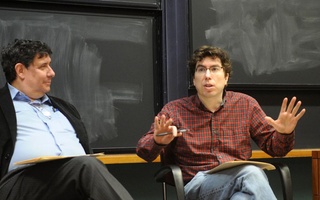To the editor:
I write regarding the article, “New Lecture Policy Calls for New Forms of Student Interaction,” by Michael V. Rothberg in Monday’s Crimson. Two years ago, The Crimson was reporting on the death of the lecture and the push for more active learning. With Harvard classes now being retooled for edX and HarvardX, passive learning seems to have been elevated to new heights. I admire Professor Elisa New’s dedication to interacting with students outside of class and her efforts to bring poetry analysis to the world. But surely the world’s best and brightest students don’t compete mightily to get into Harvard only to become mere backdrops to Harvard’s world stage. The conundrum Professor New faced in simultaneously teaching a general education and HarvardX course is a reminder that we need a college-wide discussion of how to maintain our pedagogical values in the brave new world of online education.
Mary D. Lewis
Professor of History at Harvard
To the editor:
I was distressed by the casual contempt for the principles of the Enlightenment displayed in Sandra Y. L. Korn’s column “The Doctrine of Academic Freedom.” Korn’s ill-considered essay tries to establish that “When an academic community observes research promoting or justifying oppression, it should ensure that this research does not continue,” which appears to defend the firing or attempted firing of professors based on their writings, and argues that universities should stop professors from publishing discriminatory ideas.
Though Korn’s commitment to the welfare of oppressed groups is laudable, her support of university censorship is toxic to liberty and democracy. The modern concept of freedom of speech is based on the notion that unrestricted discussion of ideas, even false and bigoted ideas, will arrive at the truth. There are conceivable arguments against this notion, but Korn makes none of them; she further asks us to take on faith that her particular views of what constitutes “oppression” are worthy criteria for censorship.
The arrogance of this position aside, one wonders whether Korn recognizes the danger that a censor with differing views could pose not only to freedom and truth but also to her own political goals. William F. Buckley shared some of her notions that “academic freedom” was used as a fig leaf for the advocacy of dangerous ideas in his book “God and Man at Yale.” But for Buckley, “dangerous ideas” included atheism and the economic theory of John Maynard Keynes.
A world where freedom of speech is subject to administrative censorship and the heckler's veto is one in which neither I nor Korn would want to live. Threatening the livelihoods of professors who investigate controversial subjects is an affront to liberty.
Connor M. Harris '16
Read more in Opinion
Testing the H-BombRecommended Articles
-
Harvard College Sponsored First Printing Press Set Up in U. S. A.The first printing press in America was set up in Cambridge under the guaranty of Harvard College, during the presidency
-
 Expert Panel Discusses Censorship in China
Expert Panel Discusses Censorship in China -
A New Take on CensorshipThe Chinese government views Google’s decision to challenge China’s censorship laws by threatening to leave the country as yet another instance of Westerners denying China its sovereign right to govern.
-
Writers Series Event Breathes Life into Censored Authors’ Works“I don’t see too many things where people from a variety of countries are bought together. I think that’s just really a special sort of opportunity to see things in different ways, and you can do that at Harvard.”
-
 Tent Talk: My Night With Occupy Harvard
Tent Talk: My Night With Occupy Harvard -
Construction Sign on Conduct RemovedA sign encouraging construction workers to “Show Respect for Harvard” has been taken down following student protest. The sign was posted by Shawmut Design and Construction at the construction site on the Science Center plaza and contained both Shawmut and Harvard logos.













